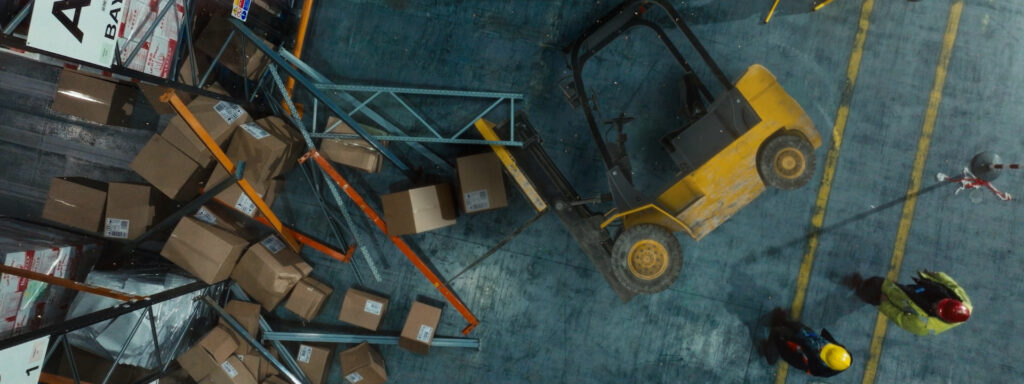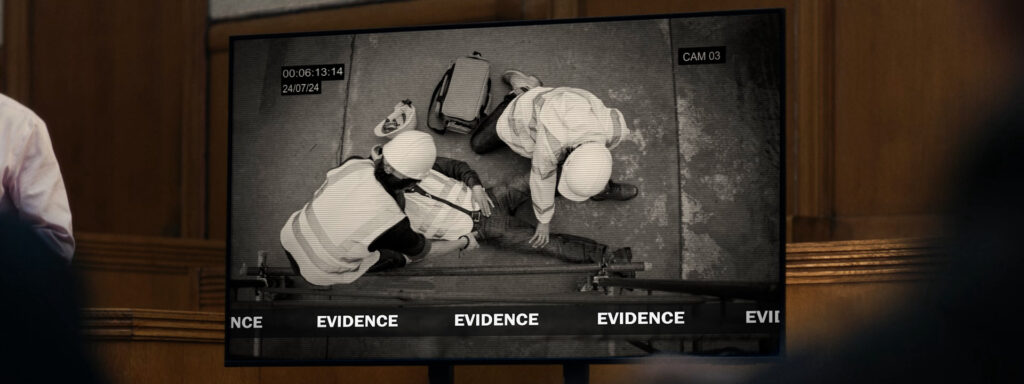Making an industrial injury claim
Industrial environments are fraught with health and safety risks, so it comes as no surprise that thousands of employees file work accident claims following an injury that they’ve sustained at work.
These types of injuries can be severe in nature and may have a long-term impact on your standard of living and ability to work.
As one of the leading personal injury claims specialists in the UK, the team at Injury Lawyers 4u is here to talk through your claim and help you regain peace of mind following an industrial injury. Rest assured, we’ve been there many times before and have helped thousands of people in the same position as you.

Am I eligible to make an industrial injury claim?
If you’ve suffered an injury at work, you might be eligible to make an industrial injury claim. Whether or not you can claim will depend on a few key factors: the nature of your injury, how it happened, and whether your employer’s negligence was involved.
To make a successful claim, you need to show that your employer didn’t provide a safe working environment. This could mean they didn’t give you the proper training needed to perform your job, failed to maintain machinery, ignored safety protocols, or exposed you to harmful substances without protection.
To be eligible for an industrial injury claim, you should:
- Have been injured or developed a condition because of your work environment.
- Be able to prove that your employer was negligent or didn’t meet their duty of care.
If you’re not sure about your eligibility, it’s important to act quickly. Check your claim’s validity and gather evidence like medical records, incident reports, and witness statements. Our experienced team at Injury Lawyers 4u can help you through the process and give you the best chance of a successful claim.
What types of industrial injuries and accidents can I claim compensation for?
Industrial workplaces can be dangerous, and injuries can happen in a host of different scenarios. Here are some common industrial injuries for which you can claim compensation:
Electric shocks: These are often caused by faulty wiring or malfunctioning equipment and can lead to burns, nerve damage, or more severe complications like cardiac arrest.
Burns: These injuries can be caused by contact with hot surfaces, chemicals, or explosions, causing significant skin damage and scarring.
Slips, trips, and falls: Commonly due to wet floors, uneven surfaces, or cluttered workspaces, these accidents can lead to broken bones, sprains, or head injuries.
Damage to or loss of limbs: Severe injuries from machinery accidents, such as amputations, can have a lifelong impact on mobility and quality of life.
Injuries caused by machines: This includes being caught in, struck by, or crushed by industrial machinery, which can often lead to serious physical trauma.
Loss of hearing: Prolonged exposure to loud environments without necessary ear protection can result in permanent hearing loss.
Loss of vision: Injuries from chemical splashes, flying debris, or inadequate eye protection can cause partial or complete vision loss.
Loss of motor control: Exposure to toxic substances or repetitive strain injuries can lead to neurological problems, affecting movement and coordination.
Musculoskeletal problems: Heavy lifting, repetitive motions, or poor ergonomics can cause chronic back pain, joint issues, and other musculoskeletal disorders.
Remember, this list isn’t exhaustive. If you’ve suffered any type of injury or health condition due to your work industrial work environment, you may be eligible for compensation. Our experienced team at Injury Lawyers 4u is here to help you understand your rights and guide you through the claims process, from filing a claim all the way through to settlement.
Common causes of industrial injuries and accidents
In an industrial work environment, there are several inherent risks to health and safety. While some are unavoidable, your employer has a duty to make the workplace as safe as possible for you and your colleagues. If they fail in this duty and you are injured as a result, you may have grounds to make a claim for compensation. Below are some of the most frequent causes of industrial injuries and accidents:
Poor safety training: When employees are not properly trained on safety protocols and procedures, they are at a higher risk of accidents and injuries.
Lack of personal protective equipment (PPE): Employers are required to provide appropriate PPE to protect workers from harm. Failure to supply necessary equipment can lead to serious injuries.
Faulty or poorly maintained equipment: Regular maintenance and inspection of machinery and equipment are essential in order to prevent malfunctions that can cause injuries.
Slip and trip hazards: Spills, debris, and uneven surfaces can lead to falls, which can result in injuries ranging from minor bruises to severe fractures.
Exposure to hazardous substances: Without proper ventilation and safety measures, workers can suffer from respiratory issues, chemical burns, or long-term health conditions.
Manual handling incidents: Lifting, carrying, or moving heavy objects without being shown the proper technique or being given assistance where needed can cause musculoskeletal injuries.
Repetitive strain injuries: Performing the same motions repeatedly can lead to chronic pain and conditions such as carpal tunnel syndrome.
Inadequate safety protocols: A lack of clear safety procedures and emergency plans can increase the chances of accidents happening.
If you’ve experienced any of these situations in your workplace, you might be eligible to make a claim. Contact our team at Injury Lawyers 4u to discuss your case today.
How much industrial injury compensation will receive?
The amount of compensation you could receive will depend on various factors, including the extent of your injury, its impact on your life, and your financial losses. To receive an estimate on the amount you could receive in general damages (compensation strictly for the injury itself), you can use our compensation calculator. However, for a more precise estimate that considers every aspect of your situation, including loss of income and the impact on your lifestyle, it’s best to get in touch with our experienced legal team
The compensation you receive should be enough not only to cover the pain and trauma of your injury, but also take into account medical expenses, time off work, and the effect on your daily life and family. Our expert solicitors will ensure all these factors are thoroughly evaluated to get you the support you deserve.
Can I lose my job for making an industrial injury claim?
In short, no. You cannot legally be dismissed or treated differently for making an industrial injury claim. The law protects your right to seek compensation if you’ve been injured at work due to your employer’s negligence. If your claim is legitimate and your employer has breached their duty of care, they can neither dismiss nor penalise you for seeking justice.
If you face any negative consequences at work for pursuing a claim, this could constitute unfair dismissal or workplace discrimination, and you may have grounds for further legal action. If you’re worried about your job security while making a claim, our experienced solicitors can provide guidance and support.
What evidence do I need to support my industrial injury compensation claim?
When starting the process of making an industrial injury claim, having the evidence that proves your employer’s negligence is key. Not only will this strengthen your case, but it’ll also help to ensure you receive the compensation you deserve. Here’s what you’ll need:
- Accident report: Inform your employer immediately and make sure the incident is logged in the accident book. This proves that the accident happened.
- Take photographs: Capture images of the accident scene and any hazards that contributed to your injury.
- Identify witnesses: Collect contact details from colleagues who witnessed the accident. Their statements can support your version of events.
- Seek medical attention: Make sure to get your injuries properly assessed and treated. Medical records provide an official record of your injuries.
- Request CCTV footage: If your workplace has security cameras, ask for any footage that captured your accident. This provides a clear visual account of the incident.
- Ask for employment records: These verify your employment status, job title, and duties at the time of the accident.
- Record your financial losses: Keep receipts and invoices for all expenses related to your injury, including medical bills and travel expenses for appointments.
- Save any correspondence: Keep any emails, letters, or messages exchanged with your employer about the accident or your injuries. This shows your employer’s knowledge of the incident and their response.
- Keep a diary: Make notes on the impact of your injury on your daily life, including pain levels, mobility issues, and how it affects your work and personal life.
If you need any help with this process, our team at Injury Lawyers 4u is here to help. The full impact of your injury must be accounted for and evidenced when compiling a claim to ensure you receive the best possible outcome and maximum compensation.
What are the time limits for making an industrial injury or accident claim?
Typically, you have three years from the date the incident took place to file your claim. However, there are a few exceptions to this rule:
- Delayed symptoms: If you only become aware of your injury or illness later on (for example, with conditions like asbestosis or mesothelioma), the three-year period starts from the date of your diagnosis.
- Mental capacity: If the injured person lacks the mental capacity to make a claim, there is no time limit until they regain capacity. If they never regain capacity, a claim can be made at any time on their behalf.
- Children: If the injured person is under 18, the three-year limit starts from their 18th birthday, giving them until they turn 21 to make a claim.
- Accidents abroad: If the accident occurred while working abroad, the time limits might be different depending on the country’s laws where the incident happened. It’s important to check local regulations and seek legal advice quickly.
No matter your situation, it’s best to start your personal injury claim as soon as possible. This allows your legal team plenty of time to gather evidence and build the strongest possible case. Contact us today to discuss your case and start your claim.
Next steps for making an industrial injury claim
Get in touch with our friendly personal injury claims team for a free, no-obligation consultation. You can reach us directly on 0333 400 4445 or, if you’d prefer, please feel free to fill in the contact form to arrange a call back at a time that suits you.



